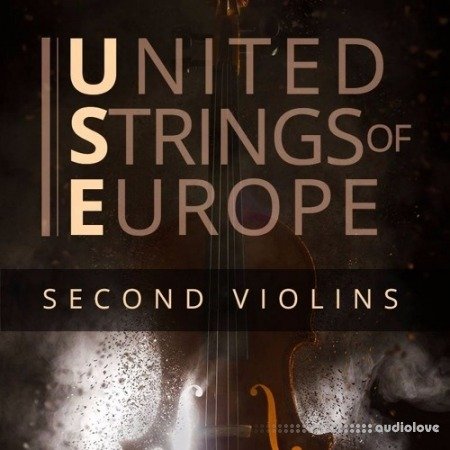Additional Libraries
Auddict United Strings of Europe: Second Violins [KONTAKT]

Team DECiBEL | 29 February 2020 | 7.58 GB
The United Strings of Europe is a London-based ensemble made up of young professionals from across the European Union and Switzerland with the goal of promoting musical and cultural cooperation at the highest level.
SECOND VIOLINS - Over 14GB of content
SEVEN microphone positions replicating a film scoring setup, so you can craft your own sound to taste. Separate desk spot mics can be used to simulate divisi.
Recorded at the world-renowned Cadogan Hall
Over 22,000 samples+
Multiple TRUE LEGATO sets including normal and portamento, at different dynamics (cross-fade-able with MIDI CC1)
7RR Staccato, Pizzicato and Sautille/Spiccato multiplied by multiple dynamic layers
Tremolo, Harmonics and Trills
Why do I need the First and Second Violins?
This is a very good and valid question, rightly asked by many of you!
The perfect balance and hugely sought after sound of the orchestra has been refined over centuries. In order to capture this sonic beauty with samples, each section must be meticulously captured… multiple players, each with different instruments, slightly different timbre, subtle differences in tuning, vibrato and seated in different positions in the stereo/sonic field.
Combining the USE first and second violins in your palette allows access to this beautiful, lush synergy of instruments… something not possible by layering multiple tracks of first violins, which at the very least, can cause phase problems, but more importantly, withhold your music from its full potential and depth.
With the United Strings of Europe, the second violins are particularly important, as - faithful to how the USE play (and similar to how a lot of score music is recorded) - the second violins actually sit to the right of the conductor, with first violins opposite on the left. It's common for many scores to be recorded this way, and has the benefit of basses sitting in the middle at the back (you want the bass in your track in the middle!)
On top of all this, – from a plainly musical/performance perspective - every single note in the second violins is a different and new performance to the first violins... Every note has slightly different intention, emotion and musicality. Combining and orchestrating with both sections will raise the depth of your music several-fold.
home page
SECOND VIOLINS - Over 14GB of content
SEVEN microphone positions replicating a film scoring setup, so you can craft your own sound to taste. Separate desk spot mics can be used to simulate divisi.
Recorded at the world-renowned Cadogan Hall
Over 22,000 samples+
Multiple TRUE LEGATO sets including normal and portamento, at different dynamics (cross-fade-able with MIDI CC1)
7RR Staccato, Pizzicato and Sautille/Spiccato multiplied by multiple dynamic layers
Tremolo, Harmonics and Trills
Why do I need the First and Second Violins?
This is a very good and valid question, rightly asked by many of you!
The perfect balance and hugely sought after sound of the orchestra has been refined over centuries. In order to capture this sonic beauty with samples, each section must be meticulously captured… multiple players, each with different instruments, slightly different timbre, subtle differences in tuning, vibrato and seated in different positions in the stereo/sonic field.
Combining the USE first and second violins in your palette allows access to this beautiful, lush synergy of instruments… something not possible by layering multiple tracks of first violins, which at the very least, can cause phase problems, but more importantly, withhold your music from its full potential and depth.
With the United Strings of Europe, the second violins are particularly important, as - faithful to how the USE play (and similar to how a lot of score music is recorded) - the second violins actually sit to the right of the conductor, with first violins opposite on the left. It's common for many scores to be recorded this way, and has the benefit of basses sitting in the middle at the back (you want the bass in your track in the middle!)
On top of all this, – from a plainly musical/performance perspective - every single note in the second violins is a different and new performance to the first violins... Every note has slightly different intention, emotion and musicality. Combining and orchestrating with both sections will raise the depth of your music several-fold.
home page
Only registered users can see Download Links. Please or login.


No comments yet